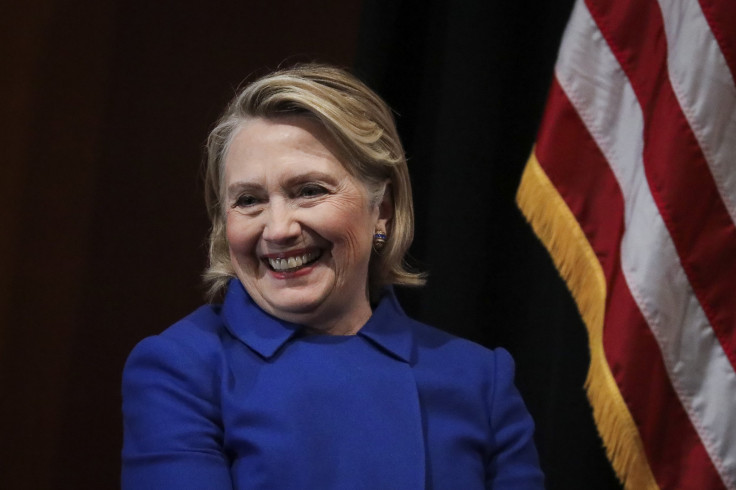Trump Impeachment: Hillary Clinton Warns Russia Could Interfere With Trial, Just Like Elections

KEY POINTS
- Hillary Clinton asserts Russia is again interfering in a U.S. presidential election
- As with 2016, the aim of the Russian interference in the 2020 election is to get their man, Trump, elected
- Russia's lastest cybertattacks hit Ukrainian company Burisma and its subsidiaries. The attacks were successful
Hillary Clinton is assailing Russia for resurrecting the online campaign of infiltration and disinformation many Western experts concur helped get Donald Trump elected president in 2016. She also warns Russia's hackers working for the country's spy agencies are poised to interfere in the 2020 election "to benefit Donald Trump."
"Russians appear to be re-running their 2016 hacking playbook, once again to benefit Donald Trump. Will the media play along again? Will the GOP open the door again? Will the Russians help pick our POTUS again?" tweeted Clinton Tuesday.
Clinton's very visible re-entry into the 2020 election circus was apparently triggered by a New York Times story asserting hackers working for the Russian military successfully infiltrated the computer network of Burisma Holdings Ltd., the Ukrainian company at the center of Trump's quid pro quo scandal with Ukraine, and its subsidiaries.
The Times' story said Russian tactics aimed at breaking into Burisma's computers "are strikingly similar to what American intelligence agencies say was Russia’s hacking of emails from Hillary Clinton’s campaign chairman and the Democratic National Committee during the 2016 presidential campaign. In that case, once they had the emails, the Russians used trolls to spread and spin the material, and built an echo chamber to widen its effect."
Russians appear to be re-running their 2016 hacking playbook, once again to benefit Donald Trump.
— Hillary Clinton (@HillaryClinton) January 14, 2020
Will the media play along again?
Will the GOP open the door again?
Will the Russians help pick our POTUS again? https://t.co/cfVPcqbY5w
Using phishing emails, Russian hackers have stolen usernames and passwords of Burisma employees and managers, according to Area 1, the Silicon Valley security firm that detected the hacking.
“The attacks were successful,” said Area 1 co-founder Oren Falkowitz, noted the New York Times. He previously worked at the National Security Agency (NSA).
Falkowitz also said the timing of the Russian cyberattacks "mirrors the G.R.U. hacks we saw in 2016 against the DNC and John Podesta." He said Russia once again is "stealing email credentials, in what we can only assume is a repeat of Russian interference in the last election.”
Other cybersecurity experts argue the timing and scale of the attacks indicate the Russians might be searching for potentially embarrassing material on the Bidens. This is precisely the same kind of information Trump wanted from Ukraine when he demanded Ukrainian president Volodymyr Zelensky launch an investigation of former vice president Jose Biden and his son, Hunter, and Burisma. This blatant abuse of presidential power triggered the chain of events that led to Trump's impeachment by the House on Dec. 18, 2019.

On Dec. 9, 2016, the U.S. Intelligence Community (USIC) agreed Russia conducted the cyberattacks and other illegal operations during the 2016 election to assist Trump win the presidency. It said it has "high confidence" the Russian government was behind the theft of emails and documents from the Democratic National Committee (DNC).
USIC also concluded specific individuals in the Russian government provided WikiLeaks with stolen emails from the DNC, as well as stolen emails from Podesta, Clinton's campaign chairman, who was also hit by the Russian cyberattack.
Forensic evidence analyzed by a number of cybersecurity firms such as CrowdStrike, Fidelis, and Mandiant strongly indicated two Russian intelligence agencies infiltrated the DNC computer systems. CrowdStrike identified these groups as Cozy Bear and Fancy Bear. The latter is behind the current cyberattacks on Burisma and its subsidiaries.
“Now we know that Vladimir Putin also sees Joe Biden as a threat,” said Andrew Bates, a spokesman for the Biden campaign. “Any American president who had not repeatedly encouraged foreign interventions of this kind would immediately condemn this attack on the sovereignty of our elections.”
That Russia was responsible for the 2016 cyberattacks was independently confirmed by former special counsel Robert Mueller. In his report, Mueller said Trump’s 2016 election campaign colluded with Russian operatives linked to the Kremlin. Mueller also said Trump obstructed justice during that investigation. Mueller also determined Russia wanted Trump to win the 2016 election.
“The investigation established that the Russian government perceived it would benefit from a Trump presidency and worked to secure that outcome," said Mueller's report.
© Copyright IBTimes 2024. All rights reserved.





















